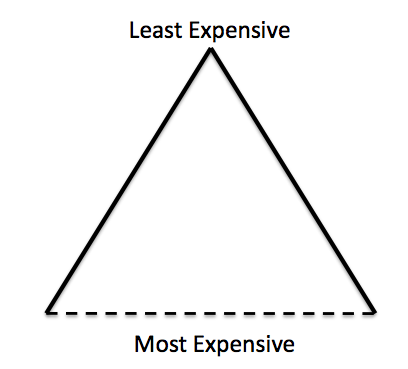Det har kommit en ny rapport från University of California, Santa Barbara om hur Peak oil kommer att ställa oss inför stora utmaningar. Detta tillsammans med ekonomisk nedgång kommer att göra det svårare att adressera olika miljöproblem. Och ju fortare vi går över till ett Post Peak samhälle desto bättre.
Rapporten tar upp dessa områden, det är återigen de tre E’na som kommer upp Energi, Ekonomi och Ekologi.
- Peak oil is happening now.
- The era of cheap and abundant oil is over.
- Global conventional oil production likely peaked around 2005 – 2008 or will peak by 2011.
- Global oil reserve discoveries peaked in the 1960’s.
- New oil discoveries have been declining since then, and the new discoveries have been smaller and in harder to access areas (e.g., smaller deepwater reserves).
- Huge investments are required to explore for and develop more reserves, mainly to offset decline at existing fields.
- An additional 64 mbpd of gross capacity – the equivalent of six times that of Saudi Arabia today – needs to be brought on stream between 2007 – 2030 to supply projected business as usual demand.
- Since mid-2004, the global oil production plateau has remained within a 4% fluctuation band, which indicates that new production has only been able to offset the decline in existing production.
- The global oil production rate will likely decline by 4 – 10.5% or more per year.
- Substantial shortfalls in the global oil supply will likely occur sometime between 2010 – 2015.
- Furthermore, the peak global production of coal, natural gas, and uranium resources may occur by 2020 – 2030, if not sooner.
- Global peak coal production will likely occur between 2011 – 2025.
- Global natural gas production will likely peak sometime between 2019 – 2030.
- Global peak uranium will likely occur by 2015 to sometime in the 2020’s.
- Oil shortages will lead to a collapse of the global economy, and the decline of globalized industrial civilization.
- Systemic collapse will evolve as a systemic crisis as the integrated infrastructure and economy of our global civilization breaks down.
- Most governments and societies – especially those that are developed and industrialized – will be unable to manage multiple simultaneous systemic crises. Consequently, systemic collapse will likely result in widespread confusion, fear, human security risks, and social break down.
- This current transition of rapid economic decline was triggered by the oil price shock starting in 2007 and culminating in the summer of 2008. This transition will likely accelerate and become more volatile once oil prices exceed $80 – $90 per barrel for an extended time. Demand destruction for oil may be somewhere above $80 per barrel and below $141 per barrel.
- Economic recovery (i.e., business as usual) will likely exacerbate the global recession by driving up oil prices.
- A managed “de-growth” is impossible, because effective mitigation of peak oil will be dependent on the implementation of mega-projects and mega-changes at the maximum possible rate with at least 20 years lead time and trillions of dollars in investments.
- Peak oil and the events associated with it will be an unprecedented discontinuity in human and geologic history.
- Adaptation is the only strategy in response to peak oil.
- Mitigation and adaptation are the only strategies for climate change.
- Peak oil crises will soon confront societies with the opportunity to recreate themselves based on their respective needs, culture, resources, and governance responses.
- The impacts of peak oil and post-peak decline will not be the same equally for everyone everywhere at any given time.
- There are probably no solutions that do not involve at the very least some major changes in lifestyles.
- The localization of economies will likely occur on a massive scale, particularly the localization of the production of food, goods, and services.
- Existential crises will soon confront societies with the opportunity to recreate themselves based on their respective needs, culture, resources, and governance responses.
- If the international community does not make a transcendent effort to cooperate to manage the transition to a non-oil based economy, it may risk a volatile, chaotic, and dangerous collapse of the global economy and world population.
- Since the advent of the Green Revolution, the global human population has increased from 2.5 billion in 1950 to nearly 7 billion today.
- Global demand for natural resources exceeded planet’s capacity to provide sustainably for the combined demands of the global population between 1970 – 1980.
- The global population is projected to grow to around 9.2 billion by 2050.
- Current trends in land, soil, water, and biodiversity loss and degradation, combined with potential climate change impacts, ocean acidification, a mass extinction event, and energy scarcity will significantly limit the human carrying capacity of the Earth.
- Based on these estimates, the global population may have nearly reached or already exceeded the planet’s human carrying capacity in terms of food production.
Av rubrikerna att döma så tar den upp det som vi har behandlat här, den varna även för en systemisk kollaps.
Det finns flera rapporter om olika ämnen här.
__________________
Antal lästa gånger: [CPD_READS_THIS]










Hej Bengt!
Kända sanningar och konsekvenser, men när reagerar de styrande och börjar prata klartext?
Och när involveras medborgarna i en omfattande plan B, lokalt, regionalt och nationellt? Det går inte att hantera omställningen privat, utan den måste ske tillsammans med andra.
Ja det är känt det mesta nu, har ASPO kanske redan spelat ut sin roll? Men vi får fortsätta till vi har fått Myndigheter och Politiker att agera.
Hej Bengt!
När IEA konfirmerat, det vi förfäktat under många år, att vi har nått maximal utvinning av crude oil med en efterföljande minskning med 8,3 %, är det hög tid att höja tonläget och styra över på konsekvenserna av detta tapp för samhällets möjligheter att rulla på enligt BU!. IEA rapporten bekräftar de forskningsrapporter och slutsatser som Globala Energisystem i Uppsala lagt fram de senaste 5 åren.
Tycker att hearing med politikerna är ett bra första steg. Kanske skulle ASPO diskutera hur det fortsatta opinionsarbetet skulle kunna utformas!?
Sen undrar jag varför det är så tyst från Globala Energisystem och Kjell Aleklett, Med tanke på IEA:s rapport. Tycker att analysen från Chris M den 23 nov i tre delar var bra!
http://www.chrismartenson.com/blog/economy-set-starve/48474#part-ii